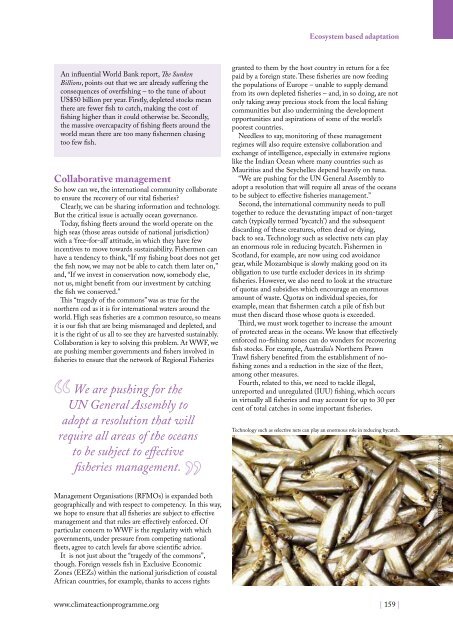Climate Action 2010-2011
You also want an ePaper? Increase the reach of your titles
YUMPU automatically turns print PDFs into web optimized ePapers that Google loves.
Ecosystem based adaptation<br />
An influential World Bank report, The Sunken<br />
Billions, points out that we are already suffering the<br />
consequences of overfishing – to the tune of about<br />
US$50 billion per year. Firstly, depleted stocks mean<br />
there are fewer fish to catch, making the cost of<br />
fishing higher than it could otherwise be. Secondly,<br />
the massive overcapacity of fishing fleets around the<br />
world mean there are too many fishermen chasing<br />
too few fish.<br />
Collaborative management<br />
So how can we, the international community collaborate<br />
to ensure the recovery of our vital fisheries?<br />
Clearly, we can be sharing information and technology.<br />
But the critical issue is actually ocean governance.<br />
Today, fishing fleets around the world operate on the<br />
high seas (those areas outside of national jurisdiction)<br />
with a ‘free-for-all’ attitude, in which they have few<br />
incentives to move towards sustainability. Fishermen can<br />
have a tendency to think, “If my fishing boat does not get<br />
the fish now, we may not be able to catch them later on,”<br />
and, “If we invest in conservation now, somebody else,<br />
not us, might benefit from our investment by catching<br />
the fish we conserved.”<br />
This “tragedy of the commons” was as true for the<br />
northern cod as it is for international waters around the<br />
world. High seas fisheries are a common resource, so means<br />
it is our fish that are being mismanaged and depleted, and<br />
it is the right of us all to see they are harvested sustainably.<br />
Collaboration is key to solving this problem. At WWF, we<br />
are pushing member governments and fishers involved in<br />
fisheries to ensure that the network of Regional Fisheries<br />
We are pushing for the<br />
UN General Assembly to<br />
adopt a resolution that will<br />
require all areas of the oceans<br />
to be subject to effective<br />
fisheries management.<br />
Management Organisations (RFMOs) is expanded both<br />
geographically and with respect to competency. In this way,<br />
we hope to ensure that all fisheries are subject to effective<br />
management and that rules are effectively enforced. Of<br />
particular concern to WWF is the regularity with which<br />
governments, under pressure from competing national<br />
fleets, agree to catch levels far above scientific advice.<br />
It is not just about the “tragedy of the commons”,<br />
though. Foreign vessels fish in Exclusive Economic<br />
Zones (EEZs) within the national jurisdiction of coastal<br />
African countries, for example, thanks to access rights<br />
granted to them by the host country in return for a fee<br />
paid by a foreign state. These fisheries are now feeding<br />
the populations of Europe – unable to supply demand<br />
from its own depleted fisheries – and, in so doing, are not<br />
only taking away precious stock from the local fishing<br />
communities but also undermining the development<br />
opportunities and aspirations of some of the world’s<br />
poorest countries.<br />
Needless to say, monitoring of these management<br />
regimes will also require extensive collaboration and<br />
exchange of intelligence, especially in extensive regions<br />
like the Indian Ocean where many countries such as<br />
Mauritius and the Seychelles depend heavily on tuna.<br />
“We are pushing for the UN General Assembly to<br />
adopt a resolution that will require all areas of the oceans<br />
to be subject to effective fisheries management.”<br />
Second, the international community needs to pull<br />
together to reduce the devastating impact of non-target<br />
catch (typically termed ‘bycatch’) and the subsequent<br />
discarding of these creatures, often dead or dying,<br />
back to sea. Technology such as selective nets can play<br />
an enormous role in reducing bycatch. Fishermen in<br />
Scotland, for example, are now using cod avoidance<br />
gear, while Mozambique is slowly making good on its<br />
obligation to use turtle excluder devices in its shrimp<br />
fisheries. However, we also need to look at the structure<br />
of quotas and subsidies which encourage an enormous<br />
amount of waste. Quotas on individual species, for<br />
example, mean that fishermen catch a pile of fish but<br />
must then discard those whose quota is exceeded.<br />
Third, we must work together to increase the amount<br />
of protected areas in the oceans. We know that effectively<br />
enforced no-fishing zones can do wonders for recovering<br />
fish stocks. For example, Australia’s Northern Prawn<br />
Trawl fishery benefited from the establishment of nofishing<br />
zones and a reduction in the size of the fleet,<br />
among other measures.<br />
Fourth, related to this, we need to tackle illegal,<br />
unreported and unregulated (IUU) fishing, which occurs<br />
in virtually all fisheries and may account for up to 30 per<br />
cent of total catches in some important fisheries.<br />
Technology such as selective nets can play an enormous role in reducing bycatch.<br />
© Creative commons/flickr/ Joost J. Bakker IJmuiden<br />
www.climateactionprogramme.org | 159 |












